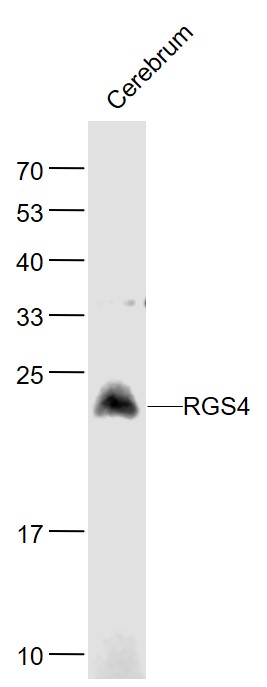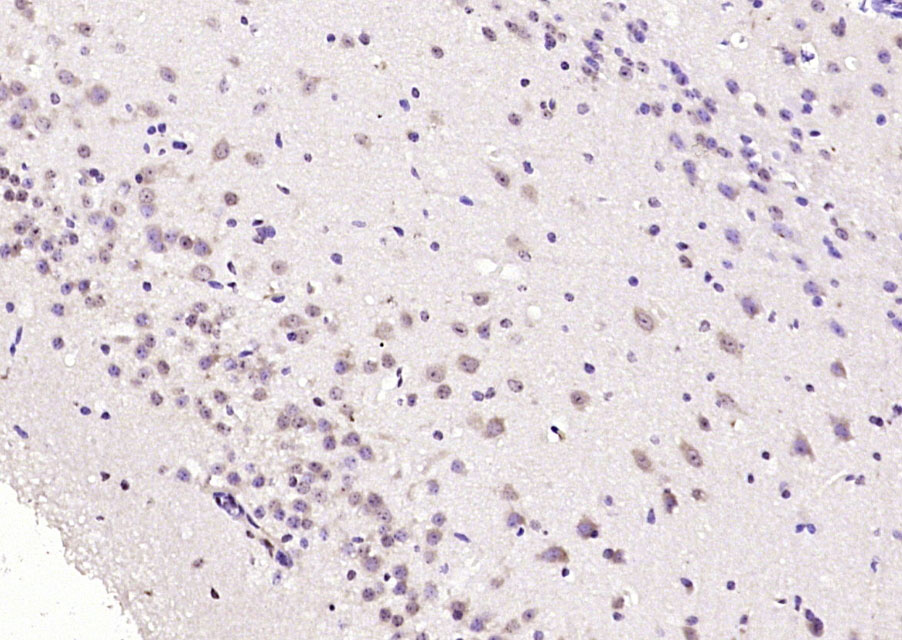
Rabbit Anti-RGS4 antibody
Regulator of G protein signalling 4; Regulator of G-protein signaling 4; RGP 4; RGP-4; RGS 4; RGS4; RGS4_HUMAN; Schizophrenia disorder 9; SCZD 9; SCZD9; MGC2124; MGC60244.
View History [Clear]
Details
Product Name RGS4 Chinese Name 精神分裂症相关蛋白9抗体 Alias Regulator of G protein signalling 4; Regulator of G-protein signaling 4; RGP 4; RGP-4; RGS 4; RGS4; RGS4_HUMAN; Schizophrenia disorder 9; SCZD 9; SCZD9; MGC2124; MGC60244. Research Area Cardiovascular Neurobiology Signal transduction G protein signal Immunogen Species Rabbit Clonality Polyclonal React Species Mouse, (predicted: Human, Rat, Dog, Pig, Cow, Horse, Rabbit, Sheep, ) Applications WB=1:500-2000 ELISA=1:5000-10000 IHC-P=1:100-500 IHC-F=1:100-500 IF=1:50-200 (Paraffin sections need antigen repair)
not yet tested in other applications.
optimal dilutions/concentrations should be determined by the end user.Theoretical molecular weight 23kDa Cellular localization The nucleus cytoplasmic The cell membrane Form Liquid Concentration 1mg/ml immunogen KLH conjugated synthetic peptide derived from human RGS4: 51-150/205 Lsotype IgG Purification affinity purified by Protein A Buffer Solution 0.01M TBS(pH7.4) with 1% BSA, 0.03% Proclin300 and 50% Glycerol. Storage Shipped at 4℃. Store at -20 °C for one year. Avoid repeated freeze/thaw cycles. Attention This product as supplied is intended for research use only, not for use in human, therapeutic or diagnostic applications. PubMed PubMed Product Detail Inhibits signal transduction by increasing the GTPase activity of G protein alpha subunits thereby driving them into their inactive GDP-bound form. Activity on G(z)-alpha is inhibited by phosphorylation of the G-protein. Activity on G(z)-alpha and G(i)-alpha-1 is inhibited by palmitoylation of the G-protein.
Function:
Inhibits signal transduction by increasing the GTPase activity of G protein alpha subunits thereby driving them into their inactive GDP-bound form. Activity on G(z)-alpha is inhibited by phosphorylation of the G-protein. Activity on G(z)-alpha and G(i)-alpha-1 is inhibited by palmitoylation of the G-protein.
Tissue Specificity:
Expressed in brain and heart. Expressed in brain at protein level. Expressed in prefontal and visual cortex. Isoform 4 and isoform 5 are expressed ubiquitously. Isoform 1, isoform 2 and isoform 3 are not expressed in the cerebellum.
Post-translational modifications:
Palmitoylated on Cys-2 and/or Cys-12.
Phosphorylated by cyclic GMP-dependent protein kinase (By similarity).
DISEASE:
Genetic variation in RGS4 is associated with susceptibility to schizophrenia type 9 (SCZD9) [MIM:604906]. A complex, multifactorial psychotic disorder or group of disorders characterized by disturbances in the form and content of thought (e.g. delusions, hallucinations), in mood (e.g. inappropriate affect), in sense of self and relationship to the external world (e.g. loss of ego boundaries, withdrawal), and in behavior (e.g bizarre or apparently purposeless behavior). Although it affects emotions, it is distinguished from mood disorders in which such disturbances are primary. Similarly, there may be mild impairment of cognitive function, and it is distinguished from the dementias in which disturbed cognitive function is considered primary. Some patients manifest schizophrenic as well as bipolar disorder symptoms and are often given the diagnosis of schizoaffective disorder.
SWISS:
P49798
Gene ID:
5999
Database links:Entrez Gene: 5999 Human
Entrez Gene: 19736 Mouse
Omim: 602516 Human
SwissProt: P49798 Human
SwissProt: O08899 Mouse
Unigene: 386726 Human
Unigene: 41642 Mouse
Unigene: 11065 Rat
Involvement in disease;Genetic variation in RGS4 is associated with susceptibility to schizophrenia type 9 (SCZD9) . A complex, multifactorial psychotic disorder or group of disorders characterized by disturbances in the form and content of thought (e.g. delusions, hallucinations), in mood (e.g. inappropriate affect), in sense of self and relationship to the external world (e.g. loss of ego boundaries, withdrawal), and in behavior (e.g bizarre or apparently purposeless behavior). Although it affects emotions, it is distinguished from mood disorders in which such disturbances are primary. Similarly, there may be mild impairment of cognitive function, and it is distinguished from the dementias in which disturbed cognitive function is considered primary. Some patients manifest schizophrenic as well as bipolar disorder symptoms and are often given the diagnosis of schizoaffective disorder.Product Picture
Cerebrum (Mouse) Lysate at 40 ug
Primary: Anti- RGS4 (SL9452R) at 1/1000 dilution
Secondary: IRDye800CW Goat Anti-Rabbit IgG at 1/20000 dilution
Predicted band size: 23 kD
Observed band size: 23 kD
Paraformaldehyde-fixed, paraffin embedded (mouse brain); Antigen retrieval by boiling in sodium citrate buffer (pH6.0) for 15min; Block endogenous peroxidase by 3% hydrogen peroxide for 20 minutes; Blocking buffer (normal goat serum) at 37°C for 30min; Antibody incubation with (RGS4) Polyclonal Antibody, Unconjugated (SL9452R) at 1:200 overnight at 4°C, followed by operating according to SP Kit(Rabbit) (sp-0023) instructionsand DAB staining.
References (0)
No References
Bought notes(bought amounts latest0)
No one bought this product
User Comment(Total0User Comment Num)
- No comment




 +86 571 56623320
+86 571 56623320
 +86 18668110335
+86 18668110335

